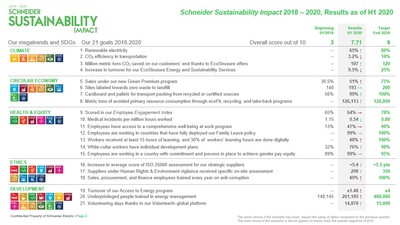Schneider's sustainability impact results on target

Schneider Electric has announced its financial and extra-financial year results for the quarter, revealing it is acting to build a green and inclusive future for all. Reaffirming a commitment to achieve 2020 goals and looking ahead to the 2030 Sustainable Development Goals (SDGs), the Group achieved a Schneider Sustainability Impact (SSI) score of 7.71 out of 10.
Each quarter, Schneider Electric publishes 21 indicators from the SSI, which measure progress towards the Group’s sustainability commitments from 2018–2020. These objectives — encompassing climate, circular economy, health and equity, ethics and development — are closely aligned with the UN SDGs and summarise the extra-financial performance of the Group.
The Group has several programs in place to meet end-of-year targets, including the Tomorrow Rising Fund — established by the Schneider Electric Foundation to move forward with recovery and resilience by supporting education and training programs.

Schneider Electric Sustainability Senior VP Gilles Vermot Desroches said, “The crisis will not compromise the achievement of our sustainability goals for 2020.
“We will keep the bar high for our 2030 commitments: to embark our worldwide ecosystem to fight climate change and uphold our responsibilities towards inclusive growth. As we continue to respond to those most in need through the Tomorrow Rising Fund — more than one million people so far in 65 countries — our focus for H2 is supporting the recovery of education and training programs. I want to give a special thanks to our employees who are giving so much of their time volunteering to support our local partners.”
Commenting on Schneider’s future outlook, Chief Strategy and Sustainability Officer Olivier Blum said, “This year is pivotal. Whilst Earth Overshoot day has moved to August 22, more than three weeks later compared to last year, we know there is more to do to build a safer, greener and truly inclusive world.
“Collectively, we need to contribute. This is why we have collaborated with like-minded companies on initiatives such as the CEO Initiative for Europe’s Recovery, Reform and Resilience. Supporting recovery post COVID-19 is one step but the aim is green recovery for all. The future relies on innovation that brings digital and energy together to fight climate change everywhere, for everyone.”
Sustainability achievements
Climate
2020 Goal #3: 120 million metric tons of CO2 saved on our customers’ end through our offers
As at Q2 2020, Schneider Electric helped customers save 107 million metric tons CO2 and are on track to meet the end-of-year target of 120 million metric tons. Publishing the Time for Climate Impact Disclosure paper, the Group outlined how their offers have saved and avoided emissions.
Circular economy
2020 Goal #8: 120,000 metric tons of avoided primary resource consumption through ECOFIT, recycling and take-back programs
Schneider exceeded its year-end target, taking its overall performance for avoiding primary resource consumption to just over 126,000 metric tons. H1 2020 accounted for 29,000 metric tons alone.
Whilst recycling of lead batteries accounted for a large part of this performance, it was Schneider Electric’s ECOFIT solution that set the scene by modernising customer equipment. It replaces key switchboard components instead of a complete product replacement. In Italy, Schneider Electric’s Stezzano plant produced 55 medium-voltage circuit breakers, helping to resurrect switchboards and extend their life. This avoided using 44 metric tons of primary resources, predominately for electric utilities, oil, gas, petrochemicals, mining, metals and minerals segments.
Refurbishment and repair of equipment also played a part. In Schneider Electric’s workshop at Greensboro, USA, 29 metric tons of programmable controllers, human machine interfaces and drives have been repaired or refurbished, thus extending their lifespan.
Health and equity
2020 Goal #14: 90% of white-collar workers have an individual development plan
With the SSI 2018–2020, the Group has further integrated performance and development processes to enable employees and managers to have broader conversations on development. This has enabled the creation of individual development plans to help employees achieve higher performance rates as well as support their career paths.
As of Q2 2020, 76% of white-collar employees have an individual development plan.
Employees and managers are encouraged to have regular check-in meetings during the year to review progress on performance and development. Schneider Electric is aware that its future success depends on the ability of all employees to drive high performance, develop critical skills and competencies, and grow their careers.
Ethics
2020 Goal #17: 350 suppliers under Human Rights & Environment vigilance received specific on-site assessment
Schneider has committed to implement a vigilance plan, which identifies and addresses sites most exposed to risks in terms of labour practices, health and safety, and environment in the Group’s ecosystem. Originally, targeting 300 onsite audits in 2018 for its suppliers, the ambition elevated to 350 a year later. Although audits were frozen for several months due to COVID-19, a total of 298 audits have been completed since launch, with 19 in H12020. Simultaneously, the team have been working on non-conformances raised in 2019, closing 65% of those identified. The commitment is to close out the remaining by 2020.
Development
2020 Goal #21: 15,000 volunteering days thanks to the company’s VolunteerIn global platform
The ‘Tomorrow Rising Fund’ supports emergency and longer-term reconstruction activities related to COVID-19. It invites employees to volunteer for ‘digital missions’ such as supporting students with their studies, coaching social entrepreneurs or even keeping in touch with isolated people. The Foundation has also partnered with NGOs to deliver essential learning tools such as IT equipment to those without direct access.
Methane reduction trial uses nature-based supplement
Woolworths Group has joined forces with SeaForest to trial the SeaFeed supplement in...
$70m investment to accelerate energy transition
The Clean Energy Finance Corporation has committed $70 million to the QIC Global Infrastructure...
Researchers warn next global SDGs will repeat mistakes
A study published in Science states that the 2030 goals were underpinned by flawed...








